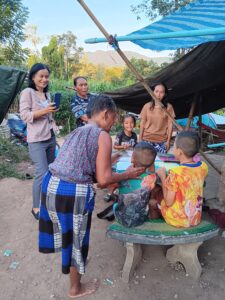Bring Healthy Food Home
We Reach out to elderly rubbish scavengers for a better and safer working environment
What We Do
Heart to Heart foundation in Loei province, Thailand reaches out to elderly rubbish scavengers for a better and safer working environment. We imagine they create food security for themself, for their families and for larger communities. They embark on their way to work on a food forest plantation instead of a rubbish mountain .
Our project involves creating soil mixed, animal feed as well as locally seeds of fruit and vegetables as a means for them to bring healthy food home. People who donate to our foundation will have an impact not only on the quality of these elderly people but the grandchildrens of those who will benefit from a broader perspective and options of life.
The Heart to Heart Foundation in Thailand focuses on several key activities to support its mission of meeting essential human needs while promoting ecological sustainability. Here are the main activities:
01.
— Food Security Initiatives
Providing nutritious meals and food distribution programs to families in need, ensuring that no one goes hungry.
02.
— Shelter Support
Assisting families in securing safe and stable housing through construction projects and housing assistance programs.
03.
— Clothing Distribution
Collecting and distributing clothing to underprivileged communities, helping individuals maintain dignity and warmth.
04.
— Ecological Sustainability Programs
Implementing practices that promote environmental stewardship, such as tree planting and sustainable farming techniques.
05.
— Alternative Job Opportunities
Offering training and support for families to develop skills for sustainable livelihoods, including crafts, farming, and small business development.
05.
— Educational Workshops
Conducting workshops focused on agriculture, nutrition, and financial literacy to empower families with knowledge and skills.
05.
— Community Development Projects
Engaging in local development initiatives that strengthen community ties and enhance overall well-being.
06.
— Child Empowerment Programs
Creating safe spaces and educational opportunities for children to learn and grow, ensuring a brighter future for the next generation.
Past activities
2023-2024
Caring is sharing
The foundation has received donations such as clothing, bags, children’s developmental toys, books, and more from international charitable organizations. These donations have been distributed to Thai families and neighboring communities in Laos and in Loei province at various orphanages and remote schools. We hosted the donation at a weekly night walking street “Pun Kan Loei” event on March 11, 2023. Since then, we have received generous support from multiple organizations that wish to share kindness with the people of Loei.
Compost for potting mix soil project
Heart Foundation initiated activities in the local community as a tool to bring together the elderly and youth under the project potting mix soil. This project involves using materials from temples, such as leaves and food waste, to create compost for producing compost. This activity serves as a starting point for fostering relationships between the elderly and youth, while also yielding soil that can be used in future projects, such as income generation and food production through seeding and planting.
The main objective is to provide opportunities for individuals and organizations who wish to support the elderly and underprivileged children to participate.by bringing materials such as Napier grass, fresh Leucaena branches, fresh sugarcane tops/leaves, cassava pulp, sugarcane sludge, molasses, microbial inoculants, animal manure, fresh rice husks, burnt rice husks, and coconut coir to donate. The foundation supports investments related to producing soil mixtures, including equipment like leaf/animal manure grinders, soil bags, and bag sealing machines. However, for each operation, we encourage participation through donations for we lack of the following categories:
Agricultural tools, such as hoes, shovels, knives, axes, sickles, spades, rakes, coconut leaf brooms, plastic baskets, wheelbarrows, and fertilizer sacks.
Materials related to soil production, including: fresh green materials and brown materials, materials for enriching and fermenting soil mixtures, such as molasses, microbial inoculants, cassava pulp, and sugarcane pulp and materials for adding value to the soil mixture, such as (dry) animal manure, burnt rice husks, coconut coir, charcoal scraps, and topsoil.
2022-2023 Documenting Life Of The Rubbish Scavengers
A Workday Timeline at the rubbish mountain of Kok Sawang Village
Work Hours
People start arriving at the landfill (which is referred to as “going to the pit” in Ban Khok Sawang) between 3-4 AM. They travel in various ways—on foot, by bicycle, motorcycle, or car. Around 30-40 people from approximately 30 households work the morning shift. More than 40 local government agencies (municipalities and subdistrict administrative organizations) send garbage trucks to this site.
Sorting Trash
There are two main methods of sorting through trash: fresh on the dumping ground and dry on the layered garbage mountains.
Fresh Trash Sorting: Although it seems dangerous, with bad smells, wet conditions, etc., fresh trash contains a variety of materials like metal, glass, and plastic bottles. There’s also the chance of finding valuable or useful items such as money, gold, new clothes, and expired but still edible food.
Dry Trash Sorting: The trash piled in layers, about five layers high, isn’t completely dry, but it has been exposed to sunlight, rain, and some pre-sorting. It mostly contains plastic, with fewer fresh items and less strong odors. Older workers, like Grandma Seng, often prefer this type of trash sorting because it can be done throughout the day, and some choose to work at night to avoid the heat of the sun.
Sorting Trash Types
The trash collected in the morning is brought back to designated sorting areas, each known and recognized without any name signs. Here, the trash is sorted into categories such as cardboard, brass, iron, glass bottles (separated by color: green, brown, clear), aluminum cans, clear plastic bottles, opaque plastic, mixed plastic, and miscellaneous items like mattresses and fertilizer sacks.
Selling the Sorted Trash
Since the landfill closes at 6 PM, by 4-5 PM, the sorted trash is packed into bags and loaded onto various vehicles, such as motorcycle-pulled carts, tricycles, or pickup trucks. The trash is then sold to recycling shops near the landfill. At the shop, the trash is weighed, categorized systematically, and sold at clearly defined prices.
Case study of Grandma Seng’s Story
Grandma Seng’s Background
Grandma Seng is a native of Ban Khok Sawang. She recalls that her mother, Grandma Son, worked at the landfill since she was born. Grandma Seng herself began working there seriously at the age of 12. Now, (2024), she is 65 years old. She married Grandpa Sanan, a man from the same village, when she was 19. They’ve been married for 45 years and have nine children together. The reason she chose this jbo is because her family didn’t have land for farming.
Living Conditions of Grandma Seng’s Family
Since they don’t own land for farming and have a large family, their homes are temporary huts made from materials they could find, just enough to provide shelter from the sun and rain. There are four huts in their living area, accommodating about 25 people. Two of Grandma Seng’s sons and their wives sleep in tents. Each hut has makeshift bathrooms and kitchens, and there is no electricity. The family typically eats together and uses hanging flashlights for light.
Family Relationships
Grandma Seng’s family is one of over 30 households that have been working in this job for more than 60 years. All nine of her children, as well as her grandchildren, work in this same profession. Grandma Seng proudly states that their job is honest work, and she has never been ashamed to tell others that she collects garbage. As a result, her family is close-knit and supportive of one another. However, other families in the village tend to be more secretive and prevent outsiders from visiting. According to the village leaders, there are likely underlying issues in some households, such as drug abuse or domestic violence.
A case study of Nongkran (Seng’s daughter)
Giant is the nickname of a 6 years old girl of 4th generation of rubbish scavenger families in Loei. Her mother (Nongkran) is 36 years old, born and bred in a rubbish mountain. Nongkran had her first son (Giant’s brother) at the age of 15. She is the daughter of 65 year old Seng, a grandmother of Giant.
This is just an example of how a lack of a better environment is affecting the lives of children who are born in rubbish scavenger’s community. Children who are raised in this family’s history often start having family from such a young age (as young as 14 to 15 years old). They live in challenging health conditions due to poor housing and sanitation.
Summary of life of rubbish scavengers (Ban Kok Sawang) in Loei, Thailand
The life of rubbish scavengers in Loei, Thailand, often referred to as waste pickers or informal recyclers, typically engage in the collection and sorting of recyclable materials from waste in the landfill (which is now a rubbish mountain).
Work and Income: Rubbish scavengers usually have irregular and physically demanding work schedules. They collect recyclable items such as plastic, glass, metal, and paper from waste bins, landfills, or even streets. Income levels can be relatively low and unstable, as they depend on the quantity and quality of materials collected, as well as fluctuations in market prices.
Informal Sector: Waste picking is generally part of the informal economy, meaning that scavengers often lack formal employment contracts, social security benefits, and legal protections. They may operate independently or collaborate with other waste pickers or recycling networks. The lack of formal recognition and support can make their livelihoods vulnerable.
Health and Safety: Rubbish scavenging involves exposure to potentially hazardous conditions, including sharp objects, toxic substances, and unsanitary waste. The physical nature of the work can lead to injuries, strains, and other health issues. Without proper protective gear and access to healthcare, waste pickers may be at risk of health problems.
Stigma and Discrimination: Due to the social stigma associated with their occupation, rubbish scavengers may face discrimination and marginalization. Their work is often undervalued, and they may be looked down upon by other segments of society. This can impact their self-esteem and social interactions.
Lack of Social Support: Many rubbish scavengers in Loei, Thailand, often come from marginalized communities and face additional challenges such as poverty, limited education, and inadequate access to basic services. They may lack proper housing, sanitation facilities, and education opportunities, which further exacerbate their living conditions.
It’s important to note that efforts have been made by governments, NGOs, and social enterprises to address the challenges faced by waste pickers. Initiatives such as waste management programs, recycling cooperatives, and campaigns promoting the formalization of their work have aimed to improve their living and working conditions.
